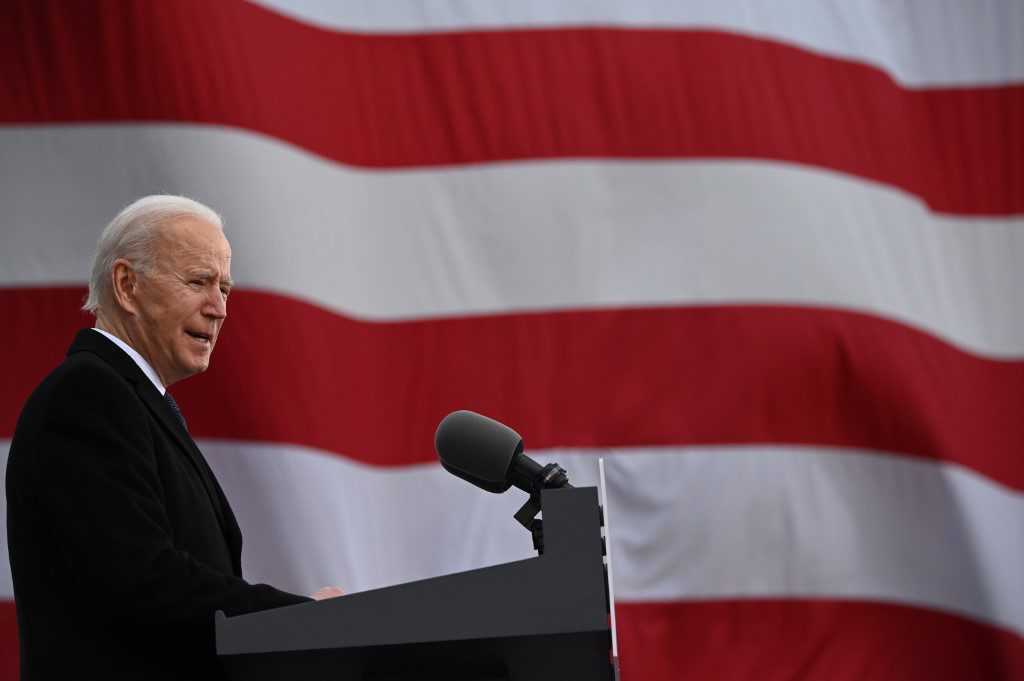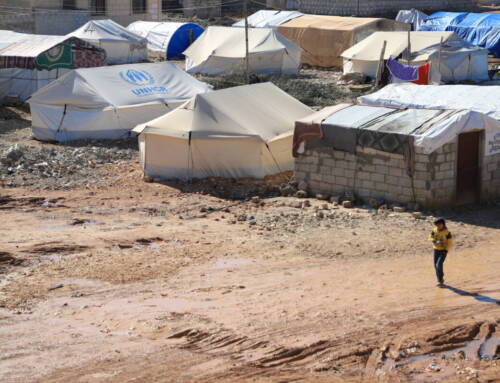What Syria policy can we expect from the Biden administration?
After four years of Donald Trump’s isolationism, Joe Biden, the 46th president of the United States of America has launched a message to foreign leaders: “America’s back.”
20 January 2021
US President-Elect Joe Biden speaks at Major Joseph R. "Beau" Biden III National Guard /Reserve Center in New Castle Airport, Delaware, before departing for Washington, DC, 19/1/2021 (AFP)
BEIRUT — After four years of Donald Trump’s isolationism and retreat from the international arena, Joe Biden, the 46th president of the United States of America as of today, has launched a message to foreign leaders: “America’s back.”
It remains to be seen how this comeback will materialize in Syria, a country where Russia, Iran and Turkey dictate the military and diplomatic pace.
Syria might not be high on the US priority list; domestically, Biden’s administration has to tackle the COVID-19 pandemic and the resurgence of white supremacy; and in terms of foreign policy, the focus seems to be on China, Russia, North Korea and Iran.
Who is who?
Most of Biden’s top picks to deal with Syria served in the Obama-Biden administration (2009-2016), a period that comprises the bloodiest years of the Syrian war.
Secretary of State nominee Antony J. Blinken, who served as deputy National Security Adviser under Obama, has acknowledged how their policy mistakes in Syria “failed to prevent a horrific loss of life.” Blinken’s comments in the press in recent days point to a continuation in the sanctions policy against Bashar al-Assad’s regime and leave any normalization efforts towards Damascus off of the table. Stronger diplomatic efforts and support to local partners in northeast Syria is to be expected.
National Security Advisor nominee Jake Sullivan and Deputy Secretary of State nominee Wendy Sherman both played a key role in the negotiations of the Iran nuclear deal (2015); this will likely spike tensions with Israel.
The selection of Brett McGurk as National Security Council’s coordinator for the Middle East and North Africa has not gone unnoticed in Ankara. As a former envoy to the US-led Global Coalition to Defeat ISIS, McGurk partnered with the Kurdish-led Syrian Democratic Forces (SDF).
The appointment of ex-UN ambassador Samantha Powers as USAID Administrator proves that “humanitarian policy will remain an important part of the Biden engagement overseas,” Jomana Qaddour, a nonresident senior fellow with the Atlantic Council, said at a Policy Forum of the Washington Institute last week. Emma Beals, a nonresident scholar with the Middle East Institute in Washington, agreed that Power’s appointment is a “hopeful sign of a much-needed diplomatic surge on humanitarian access and delivery.” Qaddour recalled that Sullivan and Blinken have reiterated “humanitarian aid and a more favorable refugee policy” as tangible goals in the Syria portfolio.
What political process?
A more intricate goal is the revitalization of the Geneva talks under the umbrella of UNSC Resolution 2254 to reach a political settlement to the war in Syria. After almost a decade of conflict, the UN-led Geneva talks seem relegated to the background by bilateral deals between Russia and Turkey or the Astana process, echoing the balance of military forces on the ground.
Syrian presidential elections are scheduled for April. Given the “lack of conditions for free and fair elections in line with UN resolution 2254,” Beals called on the US to “firmly, forcefully, and quickly reject the legitimacy of any elections held under the present conditions and work diligently toward creating those conditions in the future.”
The critical need for de-weaponizing aid
Addressing the demons of the aid system in Syria might be a more ‘feasible’ goal than untangling the political solution.
As 80% of Syrians survive on less than $1.90 per day, humanitarian aid is vital, but the global COVID-19 pandemic translates into donors’ pressure to “do more with less,” Beals pointed out.
That economic pressure will likely lead to a “reflection by the Biden administration,” added Qaddour. “Humanitarian aid from the US government perspective needs to be linked to a greater strategy in dealing with the [Syrian] conflict,” she said while reminding that for policymakers, humanitarian aid is “another tool in their toolbox” to advance foreign policy interests.
The US and European Union provide around 90% of UN humanitarian assistance to Syria. Yet, Damascus has tightened its grip on aid distribution, using it to punish opponents and reward loyalists.
Addressing the ‘weaponization’ of aid by Damascus and its allies is key. “Some in the UN have managed to undermine every attempt to reform or introduce oversight and are hedging their bets on a softer stance from the Biden administration,” Beals said while calling on the Biden administration to “not shy away from pursuing aid access for all Syrians and the need to uphold basic humanitarian principles.”
Out of fear of being accused of “politicizing humanitarian assistance,” the US and Europe “have been reluctant to use all policy levers at their disposal to improve the aid paradigm.” But this caution has “emboldened the Russians and regime to politicize the system themselves,” Daphne Mccurdy and Charles Thépaut wrote in their commentary for ‘War on the Rocks.’
To avoid this grip by Damascus and its allies, the UN adopted in 2014 a cross-border mechanism allowing aid to enter via Turkey, Jordan and Iraq without Damascus’ approval. But those border crossings have been shrinking due to Russia and China’s vetoes at the UNSC.
Bab al-Hawa, in northwest Syria, is the last border crossing still authorized, but it risks being rescinded next July. “The Russians have been very clear during the last six months that they do not want to roll that over in July,” Beals warned. She called on the Biden administration to “make very clear” that the cross-border mechanism renewal “is non-negotiable.” If that border crossing is lost, Beals reminded that “we will end up endlessly shouting about the starvation of three to four million people,” given that we cannot expect “crossline operations from Damascus into Idlib.”
The post-Trump era: picking up the pieces in the northeast
The Biden administration will have to deal with the consequences of Trump’s flip flops in the Autonomous Administration of North and East Syria (AA)-controlled areas.
In October 2019, after Trump announced the withdrawal of US troops in northeast Syria (which was later retracted), Turkey occupied the border zone between Tal Abyad and Ras al-Ayn, an area that registers occasional clashes between the SDF and the Turkish-backed Syrian National Army. In fact, McGurk, today’s nominee for National Security Council’s coordinator for the Middle East, resigned from his post as an envoy to the coalition to defeat ISIS in protest of such a sudden Trump decision that left the SDF – long time partners with the US in the fight against IS – exposed to Ankara.
Turkish lobby groups even called for McGurk’s arrest on terror charges for his work with the SDF. Ankara equates the People’s Protection Units (YPG) – a key element of the SDF – to the outlawed Kurdistan Workers’ Party (PKK).
Beyond Ankara’s focus on McGurk, Nicholas Danforth, Non-Resident Senior Research Fellow at the Hellenic Foundation for European and Foreign Policy (ELIAMEP), reminded that “Biden’s team is full of people whose patience with Ankara was already wearing thin during the Obama administration, and who were deeply alarmed by Trump’s sudden withdrawal from northeast Syria.”
“The Biden administration will certainly struggle with the question of how to rebuild US leverage in northeast Syria after Trump’s erratic policies,” Danforth said. There is consensus that the Biden administration will maintain the small contingent of US troops in the northeast to “maintain the SDF’s autonomy and preserve the gains it made against ISIS.”
The SDF have been so far excluded from the Geneva talks, but Danforth expected Biden to “push for the SDF’s inclusion in negotiations over the future of Syria, with an eye toward having the region’s autonomy recognized and security assured.”
Netanyahu’s message to Biden
In the last days of Trump’s presidency, Israel intensified its attacks on Iranian targets within Syrian territory. This is likely due to the fact that Israeli officials perceive this period as “ideal” to step up these attacks given that “Iran does not wish to retaliate in a manner that would cause Trump, in his last days in office, to escalate suddenly,” as he did when he ordered the assassination of Qasem Soleimani, the head of Quds Force (the IRGC’s foreign operations branch), said Elizabeth Tsurkov, Fellow at the Center for Global Policy.
As per Biden-Netanyahu relations, Tsurkov expected them to be “better” than with Obama given Biden’s known “hesitance to criticize Israeli human rights abuses, in line with the mainstream line of the Democratic Party elite.” This week, Blinken told the US Congress that the US’s commitment to Israel’s security is “sacrosanct.”
The will of Biden’s administration to revive the Iran nuclear deal will create tension with Netanyahu, but Tsurkov did not expect the Biden administration to “seek to restrain Israeli strikes against Iranian targets in Syria, seeing it as a legitimate use of force to counter a threat to Israeli security.”







